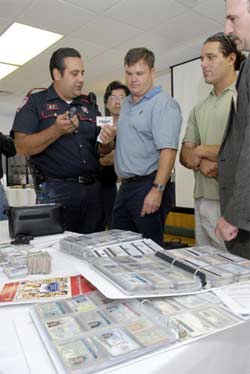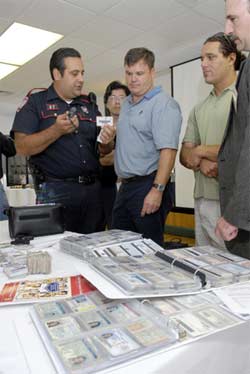for Underage Drinkers Who Try to Purchase Alcohol Illegally
Retailers Attend Police Training on Detecting Fake IDs
Narragansett, Rhode Island – September 19, 2006 — South County alcohol retailers want the Rhode Island General Assembly to take legislative action to punish underage drinkers who use fake IDs, according to business owners attending today’s South County Alcohol Retailers’ Summit. The meeting was sponsored by URI’s Common Ground, a five-year university-based prevention program funded by the National Institutes of Health.
“All of us who sell alcohol understand our responsibilities here,” said Noelle Brousseau, General Manager of Casey’s, a well-known South Kingstown restaurant. “But there’s something wrong when young people under age 21 still think it’s no big deal to use fake IDs, when they’re putting our businesses at risk. This is a crime, and we need tougher measures to get that message across.”
At issue is the state’s law governing the regulation of alcohol sales. Currently, minors who try to buy alcohol by misrepresenting their age through invalid identification are to be fined for a first offense between $100 and $250 and may have their vehicle operator’s license suspended for up to three months. Penalties for second and third offenses are higher.
Nancy Devaney of the Narragansett Youth Task Force moderated a panel that debated the merits of increasing these penalties, including a doubling of most applicable fines and mandatory (not optional) license suspensions. Panel members included Brousseau, State Senator Susan Sosnowski, State Representative Donald Lally, Narragansett Police Chief David Smith, South Kingstown Police Captain Jeffrey Allen, Toni O’Neil, owner of O’Neil’s Package Store in Narragansett, and Dr. William DeJong, a professor at the Boston University School of Public Health and a national expert on college student drinking.
There are also concerns about how local police departments and judges across the state deal with the fake ID problem. “Nationally, complaints from business owners about one-sided enforcement are becoming louder as the quality of forged identification documents improves,” said URI professor Dr. Mark Wood, co-director of the Common Ground project. “Near URI, in Narragansett and South Kingstown, enforcement levels are greater than in most towns, but even here we could do more. We need to take a hard look at how the entire criminal justice system is responding—or not responding.”
 Immediately following the summit, waitstaff and clerks working Narragansett and South Kingstown alcohol outlets attended a special training on how to check for fake IDs, presented jointly by Detective Anthony Balbi, South Kingstown Police Department, and Patrolman Scott Vellone, Narragansett Police Department. Each participating establishment received free ID checking equipment (black lights and microscopes) courtesy of Common Ground.
Immediately following the summit, waitstaff and clerks working Narragansett and South Kingstown alcohol outlets attended a special training on how to check for fake IDs, presented jointly by Detective Anthony Balbi, South Kingstown Police Department, and Patrolman Scott Vellone, Narragansett Police Department. Each participating establishment received free ID checking equipment (black lights and microscopes) courtesy of Common Ground.
The summit also featured a presentation by the University of Minnesota’s Dr. Darin J. Erickson, an expert on responsible beverage service (RBS) programs used by alcohol retailers to prevent alcohol sales to minors and excessive consumption by bar and tavern patrons. Erickson reviewed a checklist of RBS best practices, based on his research with colleague Traci Toomey. Over the past year, most business owners in Narragansett and South Kingstown signed voluntary agreements both to continue and better publicize their RBS efforts.
Bob Jergensen, owner of P.O. Pears, a bar and grill in Lincoln, Nebraska, spoke about the financial rewards of practicing responsible beverage service in a college community, using good food, entertainment, and innovation to draw in student customers. Jergensen also serves on the executive committee for the Lincoln/Lancaster County Responsible Hospitality Council, a group of business owners, police, and government and university officials committed to the responsible sale and service of alcohol.
Directed by Wood and URI Dean of Students Fran Cohen, Common Ground is a five-year project funded by the National Institute on Alcohol Abuse and Alcoholism (NIAAA), National Institutes of Health, to support URI’s ongoing prevention work with the Towns of Narragansett and South Kingstown and on-campus Greek coalitions.
The University of Rhode Island has long been seen as a leading institution in national efforts to reduce underage alcohol consumption, excessive drinking, and alcohol-impaired driving among college students. In 2002, President Robert Carothers completed three years of service on NIAAA’s Committee on Campus Drinking, which culminated with the publication of a research agenda for the nation. In 2004, President Carothers received a College Leadership Award from the Center for College Health and Safety to recognize URI’s “no tolerance” policy toward violence and drug and alcohol abuse.

